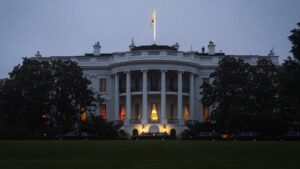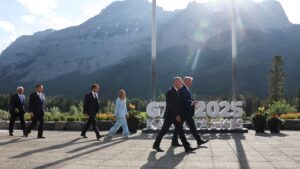Legal Battle Over Mahmoud Khalil’s Deportation Intensifies Amidst Political Protests
A legal case involving Mahmoud Khalil, a graduate student from Columbia University, has stirred significant attention as it centers around issues of free speech and political activism. The Trump administration’s efforts to deport Khalil are primarily based on a controversial letter from Secretary of State Marco Rubio, which Khalil’s legal team believes is an attempt to suppress his voice.
The letter from Rubio, submitted in an immigration court, accuses Khalil of participating in “antisemitic protests and disruptive activities” and suggests that his presence in the United States could lead to “potentially serious adverse foreign consequences.” Khalil’s attorney, Marc Van Der Hout, argued, “Two pages. That’s it. This administration wants to silence Mahmoud.”
The Department of Homeland Security’s evidence against Khalil was disclosed following an order by an immigration judge in Louisiana. Khalil, who holds status as a lawful permanent resident, faces deportation after playing a notable role in campus protests supporting Palestinians in Gaza. The Trump administration, however, claims Khalil’s activities align with supporting Hamas terrorism.
Khalil’s case serves as a vital test of the administration’s ability to deport noncitizen protesters. Judge Jamee Comans is expected to decide soon if Khalil will be deported or released. Meanwhile, Khalil’s legal team is challenging his detention in federal court in New Jersey.
Following Khalil’s arrest by ICE agents on March 8, Secretary Rubio revoked his green card under a seldom-invoked provision of the Immigration and Nationality Act of 1952. This statute allows the Secretary of State to order deportation if an individual’s presence is deemed to harm U.S. foreign policy interests.
However, amendments to the law in 1990 now safeguard lawful beliefs and associations within the U.S., raising the deportation threshold to instances where a foreigner’s presence compromises compelling U.S. foreign policy interests, as outlined here.
Additional civil charges were filed against Khalil by Homeland Security, alleging incomplete disclosure on his green card application, including his past work with a U.N. relief agency and his activist involvement at Columbia University. Khalil’s lawyers refute these civil allegations, emphasizing they are not criminal offenses.
Free speech advocates argue that the administration’s actions infringe on constitutional rights by targeting immigrants based on their political beliefs and activism. Khalil, along with other detained students and scholars, contests the legality of their arrests on constitutional grounds.

Mahmoud Khalil is seen at a pro-Palestinian protest encampment on the Columbia University campus in New York on April 29, 2024. Ted Shaffrey/AP
This article was originally written by www.npr.org






